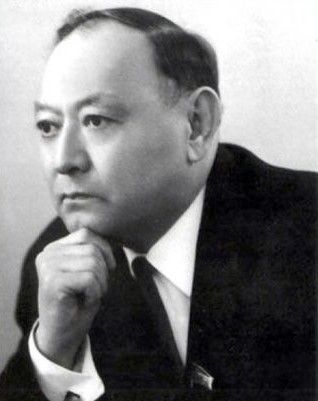A thorny path of Adiy Sharipov
Share:
Adiy Sharipov is a well-known person in Qazaqstan. He participated in the Second World War. He was a scientist, writer and public figure.
Adiy Sharipov was born on December 19, 1912 in Marinovka village, situated in Zharma district of the East Qazaqstan region.
In 1932, Adiy Sharipov entered the Faculty of Philology of the Pedagogical Institute in Alma-Ata. His teachers were bright representatives of the Qazaq intelligentsia of that time: Saken Seyfullin, Mukhtar Auezov, Ilyas Dzhansugurov. After graduation from the University, he worked as a teacher at a local school in a small settlement named Kaskelen. He was recruited by the army in 1940. Adiy Sharipov served at the Tank Corps in Belarus.

Adiy Sharipov, photo: www.kazpravda.kz
From the first days of the war, Belarus was attacked by the enemy and was surrounded. Fascist planes threw off leaflets calling for capitulation. But Belorussian people did not want to give in without struggle.
“When the command staff almost all died, the defense was led by junior lieutenant Adiy Sharipov, everyone called him Sasha”, says the wife of the writer Klara Mynzhasarova. Then he and another fifteen soldiers took refuge in the swamps. Before the war, the forester showed how to get to a secluded islet. It took soldiers a lot of time to find the right path to the islet! Adiy Sharipov used to say: “God helped us in a difficult situation! He protected us!”. They spent there a week, drinking swamp water, eating birch bark.
Later Adiy Sharipov was given a task to organize and lead a partisan detachment. In December 1941, he was seriously wounded. The operation was done in the forester’s house. The forester's daughter sewed a short fur coat for him overnight, since his overcoat was covered in blood and there was a 40-degree frost outside. “The warmth of human care kept me alive in the hell of war ...” - he would write later in the autobiographical story “The History of a Short Fur Coat”.
“Now we can openly say: many of soldiers raised their hands and surrendered. But his squad fought to the end. If there was no weapon, they got it in battle”, says Klara Mynzhasarova. “Until the end of his life, he remembered the kindness of Belarusian and Russian people, their friendship was so touching. When partisans visited the villages in the absence of fascist soldiers, the local people used to feed them and prepared Russian bath-houses. Once, the hostess suddenly came in and cried: “The Nazis came!”. The Nazi officer entered the room. He and my husband shoot, but my husband managed to be the first. After the war, he brought that gun home, then handed it over to a military office”.
When Belarus was liberated in 1944, Adiy Sharipov had a scorbutus, his health condition was very serious. He was offered to become the Head of the city of Mogilev, but he said that he should return home.
During the war years, a partisan Adiy Sharipov kept a diary, after making some notes he used to hide it in the forest or in the houses. Based on records, he made in the diary, later he wrote his famous stories about the Second World War, among them, for example, “The Partisan's Daughter”, “The History of a Short Fur Coat”, “Stars in the Prison House” and “The Fire in the Forest”.
Adiy Sharipov died on November 4, 1993 in Almaty after a serious illness. The village where he was born is named after him. His personal items, military and government awards, books are in the Central State Museum of Almaty. A monument was erected to him, and the streets in Almaty (Qazaqstan) and Minsk (Belarus) were also given his name.
Moreover, Qazaqstan and Belarus have an intention to make a feature film about a great scientist and legendary Belarusian partisan Adiy Sharipov.
Adiy Sharipov is the author of more than 350 scientific and journalistic articles and research works on pedagogy. He compiled a textbook on Qazaq Literature for students of the ninth and tenth grades of the secondary school.
He was a Minister of Education, Minister of Foreign Affairs of the Qazaq SSR, his name is listed in the bibliographic guide “Outstanding People of the Planet”, published by the International Bibliographic Center of the University of Cambridge.
He wrote the script for the film “The Forest Ballad”, which received prizes at film festivals in Tashkent and Almaty.
For his brave feats, done during the Second World War he was awarded the Order of Lenin, the Order of the Second World War of the First degree, A Red Star, “A Badge of Honor” and others.
Share: